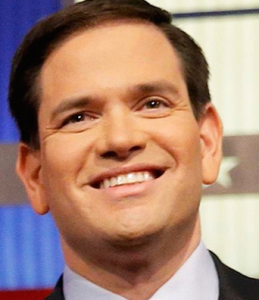Marco Rubio’s Position on Education

During a CNN town hall on February 17, 2016, Marco Rubio said that although he believed systemic racism existed, he was “not sure that there’s a political solution” to it. He emphasized, instead, disparities in educational opportunities. Rubio cites that a disproportionate number of our children are growing up in broken homes in dangerous neighborhoods, living in substandard housing and forced by the government to attend a failing school. They’re going to struggle to succeed unless something breaks that cycle.
On January 21, 2016, Rubio criticized Jeb Bush for not joining the Republican fight against the Common Core. He told reporters, “On the issue of Common Core, while we were off and many conservatives around the country were fighting against the Obama agenda, Jeb was nowhere to be found. In fact, he spent most of his time traveling the country trying to push Common Core onto our local school districts and across the country. And in some instances even criticized the conservative movement on some of these things”
In July 2013, Rubio stated his opposition to Common Core. He said, “Common Core started out as a well-intentioned effort to develop more rigorous curriculum standards. However, it is increasingly being used by the Obama Administration to turn the Department of Education into what is effectively a national school board. This effort to coerce states into adhering to national curriculum standards is not the best way to help our children attain the best education. Empowering parents, local communities and the individual states is the best approach,” according to the Tampa Bay Times. In an op-ed for the National Review on October 1, 2015, Rubio wrote that students at technical schools, online colleges, and other alternative institutions should have the same access to federal financial aid as traditional colleges.
In August 10, 2015, Rubio criticized Hillary Clinton’s “New College Compact” as being part of an “outdated” system. “We should be giving people degrees on the basis of what they know, not how many hours they sat in a classroom. I’m not saying we don’t continue with traditional higher education but we have to allow some competition to compete with traditional colleges [through] online coursework, competency based education,” Rubio explained.
Rubio wrote an op-ed in The Des Moines Register on September 13, 2015, to promote his higher education platform. He recommended reforming the accreditation system “to welcome low-cost, innovative higher education providers,” requiring schools to inform students how much they are expected to earn with a given degree prior to offering loans, increasing financial aid programs for working students, developing alternatives to student loans and correlating loan repayment with each graduate’s income.
In February 2013, Rubio introduced the Educational Opportunities Act, which proposed creating “a federal corporate and individual tax credit to promote school choice by allowing contributions to go to Scholarship Granting Organizations (SGOs) that will distribute scholarships to a student to be used toward private school tuition or expenses related to attending a private school. The U.S. Senate approved the conference report for S. 1177 – Student Success Act on December 9, 2015. Rubio missed the vote on the bill, which overhauled the No Child Left Behind Act . President Obama signed the bill into law on December 10, 2015.




